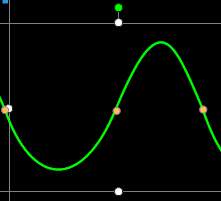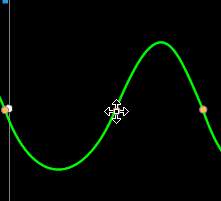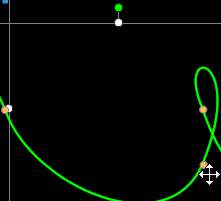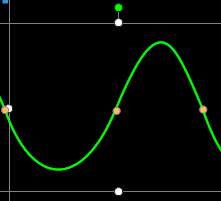CyberLink PowerDirector Help
Click on the Motion tab to add motion* to title text, allowing it to move across the screen. You can choose from a number of predefined motion paths or create your own custom title text motion.
Note: * optional feature in CyberLink PowerDirector. Check the version table on our web site for detailed versioning information. |
Using a Motion Path Template
To add motion to title text you can select a motion path template on the Motion tab that fits your requirements. Note that keyframes are added to the Position track of the Title Designer keyframe timeline. These motion path templates have predefined motion in them, but you can customize the motion. See Customizing Title Text Motion and Utilizing Title Effect Keyframes for detailed information on using keyframes to customize title text motion.
Customizing Title Text Motion
The Title Designer uses keyframes to customize the motion of title text. Keyframes are frames of your video that define the start and end points of an effect, which in this example is motion.
Note: if you added an animation effect to your title text, it may already have motion. However, you can combine these two types of effects to create impressive titles in your production. |
To customize the motion of title text:
•drag an existing keyframe to a new location in the preview window. The title text will follow the modified path to get to the changed keyframe position.



•drag the path line to alter the path the title text takes to get to the next keyframe.



•use the player controls to find a position on the motion path, and then click  on the Position track of the keyframe timeline to add a new keyframe at a new position, if required.
on the Position track of the keyframe timeline to add a new keyframe at a new position, if required.
Customizing the Speed of Title Text Motion
You have full control over the speed to the title text's motion. The following three factors determine the speed of the title text's motion.
Note: on the Properties tab in Object Settings you can manually adjust the title text position at keyframes and use ease in/out to make the movement look smoother. See Changing Object Settings for more information. |
Duration of the Title Effect in the Timeline
The longer the duration of title effect clip, the slower the title text's motion is. For example, if the title effect clip is 10 seconds, it takes the title text 10 seconds to travel from the first Position keyframe to the last Position keyframe.
Distance Between Keyframes
The distance between each keyframe also contributes to the speed of the title text motion. The further the distance between each keyframe, the quicker the title text needs to move to get to the next keyframe.
Keyframe Timeline
The keyframe timeline is located below the preview window. Each keyframe in the motion path has a corresponding marker on the keyframe timeline.
Note: if you cannot find the keyframe timeline in the Title Designer, just click the |

If the title effect clip on the timeline has a duration of 10 seconds, the keyframe timeline is 10 seconds long. To increase the speed of title text motion, drag a keyframe marker closer to previous keyframe marker.

Saving a Custom Title Text Motion Path
Once you finish modifying your title text path you can save it for future use. To save a motion path, click on  to save it as a custom path. It is then available in motion path list the next time you want to use it.
to save it as a custom path. It is then available in motion path list the next time you want to use it.
 button under the preview window to display it.
button under the preview window to display it.